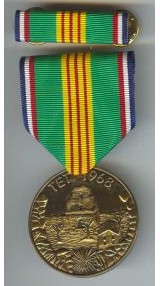This article appears on the MSNBC Hardball with Chris Matthews blog  For at least the last two years, government officials and military officers have shied away from comparisons between Iraq and Vietnam – with good reason. There are few parallels between the two situations. New York Times columnist Tom Friedman recently called the current violence in Iraq "the jihadist equivalent of the Tet offensive." I am sure the leadership – both civilian and military – at the Pentagon cringed when President Bush said that Friedman might be right.
For at least the last two years, government officials and military officers have shied away from comparisons between Iraq and Vietnam – with good reason. There are few parallels between the two situations. New York Times columnist Tom Friedman recently called the current violence in Iraq "the jihadist equivalent of the Tet offensive." I am sure the leadership – both civilian and military – at the Pentagon cringed when President Bush said that Friedman might be right.
The Tet (lunar new year) Offensive of 1968 was a concerted effort by the Viet Cong and the North Vietnamese Army to strike a decisive blow at South Vietnamese and American forces. Militarily, it was a defeat for the North Vietnamese and effectively destroyed the Viet Cong as a fighting force. However, it created what military strategists call the “significant emotional event” that turned the tide of public opinion in the United States against the war and led to the eventual withdrawal of American forces from Southeast Asia. The creation of a “significant emotional event” is an acknowledged tactic for an insurgency, along with attempts to influence the media. Most successful insurgencies do not succeed on the battlefield – they succeed in the national psyche of the occupying country.
Other examples of a “significant emotional event” involving deployed U.S. forces:
- the bombing of the Marine barracks at Beirut airport in 1983 by Hizballah in which 241 American servicemen were killed. Less than four months later, President Reagan ordered the Marines to withdraw.
- the battle in Mogadishu, Somalia in which 18 Army Rangers were killed in a day-long firefight with forces of guerilla leader Mohamed Farrah Aidid. Although the raid technically achieved its objectives, the loss of two helicopters and the mistreatment of the bodies of American troops caused President Clinton to withdraw the troops a few months later.
Foreign militaries and insurgents alike took note of these events. Prior to the American-led invasion of Iraq in 2003, Saddam Hussein provided copies of the book Blackhawk Down (which chronicled the Mogadishu battle) to his senior commanders. Knowing full well his forces could not effectively fight American troops force-on-force, he believed that using such tactics might either delay the battle long enough or cause enough American casualties to achieve some negotiated settlement.
President Bush, his spokesman Tony Snow and Multinational Forces-Iraq spokesman Major General William Caldwell have all stated that they believe the timing of the increase in violence is not coincidental. All three have commented that the insurgents may be trying to influence the upcoming U.S. elections.
It could be – we have seen numerous examples that the insurgents, be they Iraqis or foreigners, are well versed in the American media’s impact on public opinion. They may be increasing the level of attacks on American forces – this has been the bloodiest month for U.S. troops in two years – rather than attacking each other. Their likely goal: creating that significant emotional event that will either turn American public opinion against the war or influence the upcoming election, or both.
--------------
Lt Col Rick Francona is an MSNBC military analyst and a veteran of both the Vietnam and Persian Gulf wars.
October 20, 2006
Iraqi Insurgency and the Jihadist Tet?
Labels:
Iraq

.jpg)
